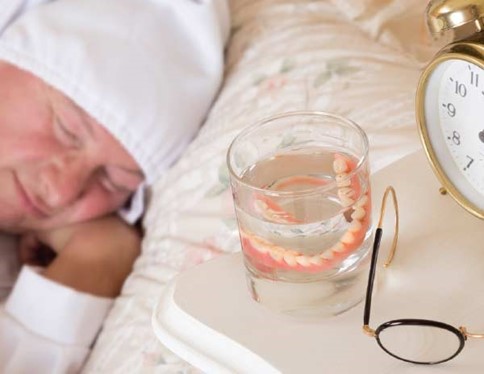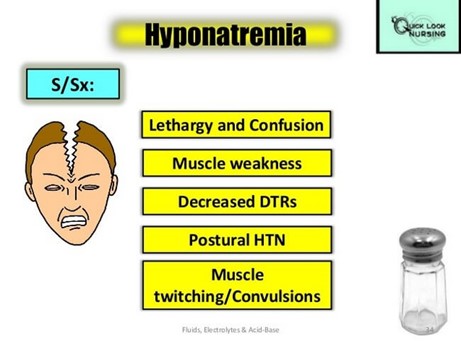A nurse is collecting data about a client’s oral care. The client wears dentures and reports having mouth sores.
The nurse should identify which of the following oral care practices by the client as a possible cause of the mouth sores?
Rinses dentures after meals.
Soaks dentures in water after removal.
Applies an adhesive to seal dentures in place.
Wears dentures while sleeping at night.
The Correct Answer is D
It can also increase the risk of denture stomatitis and pneumonia.
Dentures should be removed overnight and soaked in a denture-cleansing solution.
Choice A is wrong because rinsing dentures after meals can help remove food debris and prevent plaque buildup.
Choice B is wrong because soaking dentures in water after removal can prevent them from drying out and losing their shape.

However, water alone is not enough to disinfect dentures, so a denturecleansing solution should also be used.
Choice C is wrong because applying an adhesive to seal dentures in place can improve the fit and comfort of dentures.
However, adhesive should not be used as a substitute for poorly fitting dentures, and any excess adhesive should be removed by brushing.
Nursing Test Bank
Naxlex Comprehensive Predictor Exams
Related Questions
Correct Answer is B
Explanation

This means low sodium levels in the blood.
Sodium is an electrolyte that helps regulate fluid balance and nerve and muscle function.
Vomiting and diarrhea can cause dehydration and loss of sodium through fluids.
Normal sodium levels are between 135 to 145 millimole/Liter.
Choice A is wrong because hypermagnesemia means high magnesium levels in the blood.
Magnesium is another electrolyte that helps with nerve and muscle function, as well as blood pressure and blood sugar regulation.
Hypermagnesemia is rare and usually caused by kidney failure or excessive use of magnesium supplements or laxatives.
Normal magnesium levels are between 1.46 to 2.68 milligram/deciliter.
Choice C is wrong because hypocalcemia means low calcium levels in the blood.
Calcium is an electrolyte that helps with bone health, muscle contraction, blood clotting and nerve signaling.
Hypocalcemia can be caused by vitamin D deficiency, kidney disease, thyroid problems or certain medications.
Normal calcium levels are between 8.8 to 10.7 milligram/deciliter.
Choice D is wrong because hyperkalemia means high potassium levels in the blood.
Potassium is an electrolyte that helps with nerve and muscle function, especially the heart.
Hyperkalemia can be caused by kidney disease, diabetes, adrenal gland disorders or certain medications.
Normal potassium levels are between 3.6 to 5.5 millimole/Liter.
Correct Answer is C
Explanation
- When coordinating the care of a group of clients with assistive personnel (AP), it's important to delegate tasks appropriately based on the AP's scope of practice and training. Here are the tasks that can be assigned to the AP:
Measure the intake and output of a client who has received furosemide: This task involves recording fluid intake and output, which is typically within the scope of practice for an AP, as long as they have been trained in the proper procedure and documentation.
Check a client’s peripheral IV site for redness or swelling: This task involves basic assessment and can be assigned to an AP, as long as they are familiar with the signs of potential complications related to IV sites and have been trained in the facility's protocol for reporting any issues.
Reinforcing teaching with a client about crutch-gait walking: Education and reinforcement of information provided by healthcare professionals can often be delegated to APs, especially if they have received training on the specific topic. However, it's important to ensure that the AP is knowledgeable about crutch-gait walking and the information they are reinforcing.
The task related to assessing pain (e.g., assessing the pain level of a client who has received acetaminophen) should generally be performed by a licensed healthcare provider, such as a nurse. Assessment of pain requires a deeper understanding of the client's pain experience and may involve making clinical decisions related to pain management.
Whether you are a student looking to ace your exams or a practicing nurse seeking to enhance your expertise , our nursing education contents will empower you with the confidence and competence to make a difference in the lives of patients and become a respected leader in the healthcare field.
Visit Naxlex, invest in your future and unlock endless possibilities with our unparalleled nursing education contents today
Report Wrong Answer on the Current Question
Do you disagree with the answer? If yes, what is your expected answer? Explain.
Kindly be descriptive with the issue you are facing.
